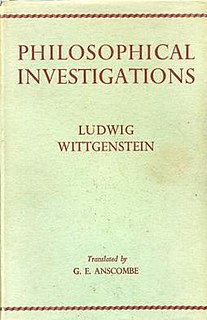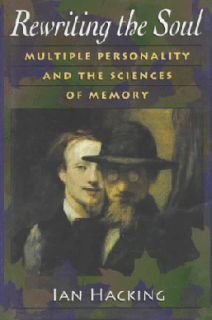Related Research Articles
Normative ethics is the study of ethical behaviour, and is the branch of philosophical ethics that investigates the questions that arise regarding how one ought to act, in a moral sense.

Philosophical Investigations is a work by the philosopher Ludwig Wittgenstein. The book was published posthumously in 1953. Wittgenstein discusses numerous problems and puzzles in the fields of semantics, logic, philosophy of mathematics, philosophy of psychology, philosophy of action, and philosophy of mind, putting forth the view that conceptual confusions surrounding language use are at the root of most philosophical problems. Wittgenstein alleges that the problems are traceable to a set of related assumptions about the nature of language, which themselves presuppose a particular conception of the essence of language. This conception is considered and ultimately rejected for being too general; that is, as an essentialist account of the nature of language it is simply too narrow to be able to account for the variety of things we do with language. This view can be seen to contradict or discard much of what he argued in his earlier work Tractatus Logico-Philosophicus (1921).

John Rogers Searle is an American philosopher. He was Willis S. and Marion Slusser Professor Emeritus of the Philosophy of Mind and Language and Professor of the Graduate School at the University of California, Berkeley until June 2019, when his emeritus status was revoked for repeated violations of the university's sexual harassment policies. Widely noted for his contributions to the philosophy of language, philosophy of mind, and social philosophy, he began teaching at UC Berkeley in 1959.
Eudaimonia is a Greek word commonly translated as 'happiness' or 'welfare'; however, more accurate translations have been proposed to be 'human flourishing, prosperity' and 'blessedness'.
Understanding is a psychological process related to an abstract or physical object, such as a person, situation, or message whereby one is able to use concepts to model that object. Understanding is a relation between the knower and an object of understanding. Understanding implies abilities and dispositions with respect to an object of knowledge that are sufficient to support intelligent behavior.
An action is an event that an agent performs for a purpose, that is guided by the person's intention. The first question in the philosophy of action is to determine how actions differ from other forms of behavior, like involuntary reflexes. According to Ludwig Wittgenstein, it involves discovering "[w]hat is left over if I subtract the fact that my arm goes up from the fact that I raise my arm". There is broad agreement that the answer to this question has to do with the agent's intentions. So driving a car is an action since the agent intends to do so, but sneezing is a mere behavior since it happens independent of the agent's intention. The dominant theory of the relation between the intention and the behavior is causalism: driving the car is an action because it is caused by the agent's intention to do so. On this view, actions are distinguished from other events by their causal history. Causalist theories include Donald Davidson's account, who defines actions as bodily movements caused by intentions in the right way, and volitionalist theories, according to which volitions or tryings form a core aspect of actions. Non-causalist theories, on the other hand, often see intentions not as the action's cause but as a constituent of it.

Ian MacDougall Hacking is a Canadian philosopher specializing in the philosophy of science. Throughout his career, he has won numerous awards, such as the Killam Prize for the Humanities and the Balzan Prize, and been a member of many prestigious groups, including the Order of Canada, the Royal Society of Canada and the British Academy.

Eliminative materialism is the claim that certain types of mental states that most people believe in do not exist. It is a materialist position in the philosophy of mind. Some supporters of eliminativism argue that no coherent neural basis will be found for many everyday psychological concepts such as belief or desire, since they are poorly defined. Rather, they argue that psychological concepts of behaviour and experience should be judged by how well they reduce to the biological level. Other versions entail the non-existence of conscious mental states such as pain and visual perceptions.
In philosophy of mind and cognitive science, folk psychology, or commonsense psychology, is a human capacity to explain and predict the behavior and mental state of other people. Processes and items encountered in daily life such as pain, pleasure, excitement, and anxiety use common linguistic terms as opposed to technical or scientific jargon.
In psychology, theory of mind refers to the mental capacity to understand other people and their behavior by ascribing mental states to them. These states may be different from one's own states and include beliefs, desires, intentions and emotions. Possessing a functional theory of mind is considered crucial for success in everyday human social interactions and is used when analyzing, judging, and inferring others' behaviors. Deficits can occur in people with autism spectrum disorders, genetic-based eating disorders, schizophrenia, attention deficit hyperactivity disorder, cocaine addiction, and brain damage suffered from alcohol's neurotoxicity; deficits associated with opiate addiction reverse after prolonged abstinence. Having a theory of mind is very similar to but not identical with having the capacity for empathy.

Gertrude Elizabeth Margaret Anscombe, usually cited as G. E. M. Anscombe or Elizabeth Anscombe, was a British analytic philosopher. She wrote on the philosophy of mind, philosophy of action, philosophical logic, philosophy of language, and ethics. She was a prominent figure of analytical Thomism, a Fellow of Somerville College, Oxford and Professor of Philosophy at the University of Cambridge.
The intentional stance is a term coined by philosopher Daniel Dennett for the level of abstraction in which we view the behavior of an entity in terms of mental properties. It is part of a theory of mental content proposed by Dennett, which provides the underpinnings of his later works on free will, consciousness, folk psychology, and evolution.
Here is how it works: first you decide to treat the object whose behavior is to be predicted as a rational agent; then you figure out what beliefs that agent ought to have, given its place in the world and its purpose. Then you figure out what desires it ought to have, on the same considerations, and finally you predict that this rational agent will act to further its goals in the light of its beliefs. A little practical reasoning from the chosen set of beliefs and desires will in most instances yield a decision about what the agent ought to do; that is what you predict the agent will do.
Descriptive Psychology (DP) is primarily a conceptual framework for the science of psychology. Created in its original form by Peter G. Ossorio at the University of Colorado at Boulder in the mid-1960s, it has subsequently been the subject of hundreds of books and papers that have updated, refined, and elaborated it, and that have applied it to domains such as psychotherapy, artificial intelligence, organizational communities, spirituality, research methodology, and theory creation.

Peter Michael Stephan Hacker is a British philosopher. His principal expertise is in the philosophy of mind, philosophy of language, and philosophical anthropology. He is known for his detailed exegesis and interpretation of the philosophy of Ludwig Wittgenstein, his critique of cognitive neuroscience, and for his comprehensive studies of human nature.

Kantian ethics refers to a deontological ethical theory developed by German philosopher Immanuel Kant that is based on the notion that: "It is impossible to think of anything at all in the world, or indeed even beyond it, that could be considered good without limitation except a good will." The theory was developed as a result of Enlightenment rationalism, stating that an action can only be right if its maxim—the principle behind it—is duty to the moral law, and arises from a sense of duty in the actor.
The theory-theory is a scientific theory relating to the human development of understanding about the outside world. This theory asserts that individuals hold a basic or 'naïve' theory of psychology to infer the mental states of others, such as their beliefs, desires or emotions. This information is used to understand the intentions behind that person's actions or predict future behavior. The term 'perspective taking' is sometimes used to describe how one makes inferences about another person's inner state using theoretical knowledge about the other's situation.
The argument from reason is an argument against metaphysical naturalism and for the existence of God. The best-known defender of the argument is C. S. Lewis. Lewis first defended the argument at length in his 1947 book, Miracles: A Preliminary Study. In the second edition of Miracles (1960), Lewis substantially revised and expanded the argument.

Rewriting the Soul is a 1995 book by the Canadian philosopher Ian Hacking, who offers an account of the formative influences that shape people’s understandings of their lives and their understanding of the lives of those around them. Hacking's work is both a theoretical account of the concepts and modes of agentic engagement through which people encounter the world and make sense of themselves, and a psychological account of how minds relate to memories and the fragility of this relationship, especially in the lives of people exposed to extremes of suffering and cruelty. Through a study of the history and manifestations of multiple personality disorder, Hacking describes how people come to an understanding of their lives through their own memories and autobiographies. Hacking describes the shifting shared meanings that shape our memories and become the threads with which people weave their biographies.
Constantine Sandis, FRSA is a Greek and British philosopher working on philosophy of action, moral psychology, David Hume, and Ludwig Wittgenstein.
Intention is a mental state that represents a commitment to carrying out an action or actions in the future. Intention involves mental activities such as planning and forethought. Intentions could be declared and clearly defined, while in other instances, when undeclared or masked, they could be detected out of context, circumstances that determine, specify, or clarify the meaning of an event or other occurrence.
References
- ↑ Anscombe, Gertrude (1957), Intention, Harvard University Press
- ↑ Hacking, Ian (1995), Rewriting the Soul: Multiple Personality and the Sciences of Memory, Princeton University Press
- ↑ Sugarman, Jeff (2009), "Historical ontology and psychological description", Journal of Theoretical and Philosophical Psychology, 29 (1), pp. 5–15
- ↑ Hacking, Ian (2007), "Kinds of People: Moving Targets", PROCEEDINGS-BRITISH ACADEMY, 151, p. 285
- ↑ Curran, R (1997), "HACKING, IAN. Rewriting the Soul: Multiple Personalities and the Sciences of Memory", Journal of Analytical Psychology, 42 (1), pp. 174–177
- ↑ Sugarman, Jeff (2009), "Historical ontology and psychological description", Journal of Theoretical and Philosophical Psychology, 29 (1), pp. 5–15
- ↑ Lynch, M (1995), "Review Symposium on Ian Hacking: Narrative Hooks and Paper Trails: the Writing of Memory", History of the Human Sciences, 8 (4), p. 118